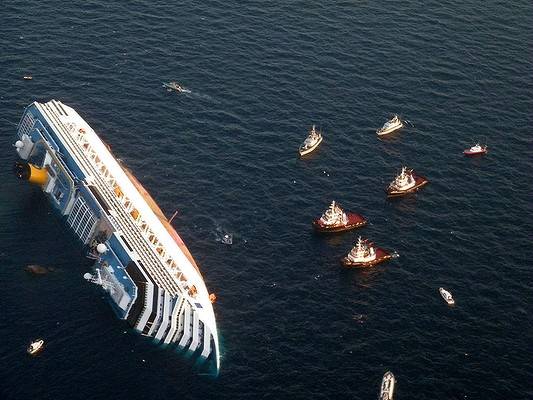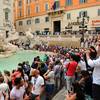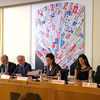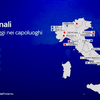Concordia-Titanic-Venice. Soul-Searching in a Shipwreck
ROME – On the late evening of Jan. 13 Captain Francesco Schettino was showing off the mammoth cruise ship in his command, the Costa Concordia, by seeking a close encounter with the Tuscan island Isola del Giglio. Perhaps the Costa managers had encouraged Schettino to do this for publicity (though what publicity could be obtained in a summer resort at night in mid-winter is debatable). Perhaps Schettino intended to blow the ship’s horn in homage to a retired sea captain living on the island. Or perhaps, as some witnesses say, Schettino was simply distracted. For whatever reason, the ship, twice the tonnage of the Titanic and carrying at least 4,229 people from 60 nations, veered 200 yards from the notoriously rock-bound shoreline, to ram into a boulder that tore a 150-foot-long hole in the hull.
Paddy Agnew, the Irish Times correspondent in Rome, was among the first of the foreign press to reach the lovely Tuscan vacation island, which has fewer than 1,500 inhabitants. “The arrival of perhaps 1,000 producers, cameramen and reporters struggling to find out what was going on transformed Giglio immediately into a media circus,” Agnew reported. “Their massive presence did little to facilitate rescue efforts.” Each time a ferryboat brought new passengers onto Giglio to see the wreck of what the Guardian has called “the floating palace of delight,” reporters flooded onto the quai to see if relatives of the thirteen victims identified so far had arrived.
This past weekend Giglio was also invaded by curiosity seekers who are now being accused of being thanotourists—that is, tourists fascinated by the morbid, by grief and horror, like those who tour London in special buses to view the place where the victim of an horrendous murder was killed. At least one of these tourists who arrived on Giglio with a camera protested that his motives were noble: “This is an historic event, on the level of the Titanic, and so I brought my eight-year-old, and when I explained it to her, she made the sign of the Cross.” This information fits in well with the news Saturday that statues of a three-foot-tall Madonna and a little Baby Jesus were successfully recovered Friday from the chapel of the doomed ship.
A result of the worldwide interest is that the Concordia, like the Titanic exactly one century ago or the Hesperus back in the mid-19th century, is already a metaphor for things that go hopelessly wrong—not only in Italy, but also in Italy. Speaking of the possible return to power of former Premier Silvio Berlusconi, reporter Agnew observed, “That would be like having Capt. Schettino come back to run a cruise ship.”
Metaphors aside, the need to recover 2,400 tons of oil and diesel fuel before they spill onto the Tuscan shores continues to be a major concern. The extraction process is to begin in earnest only after all hope is lost to rescue the missing twenty or so missing passengers. The risk to the environment just may stop a projected expansion of the port facilities at Venice which would allow more and ever bigger cruise ships to enter the lagoon. Lidia Fersuoch, head of the Venice office of the Italian heritage society Italia Nostra, warns that, “An environmental disaster here would mean the death of the lagoon.” Andrea Zanoni, an Italian member of the European Parliament, has called upon the Commission of the European Parliament to ban all mega-cruise ship traffic from approaching close to Venice or other heritage sites.
The president of the Port Authority at Venice, Paolo Costa, scoffs at such comparisons. “People comparing Giglio to Venice do not know what they’re talking about,” he maintains. Costa claims that cruise ships cannot, like the Concordia, run aground in Venice “because there is only sand and mud. The worst that can happen is that they get stuck.” In addition, cruise ship motors are idle as they enter the lagoon, where they are pulled by tug boats. This, however, ignores that the bulk of the mammoth cruise ships hoving in close to shore overwhelms the aesthetic of the city meant to be admired, while the fumes and diesel exhaust of the tugboats pollute the waters of the lagoon, and their chemical waste erodes the stone foundations of a fragile ecosystem. No one wants Venice itself to be the next Titanic.
In the Concordia disaster, heroes were not lacking. They begin with the Livorno port authority commander, Gregorio De Falco, who, in a phone call, told the slippery Capt. Schettino to “Get back on the ship, asshole” (Torna sulla nave, cazzo!), phrase which immediately became a T-shirt motto.







































i-Italy
Facebook
Google+
This work may not be reproduced, in whole or in part, without prior written permission.
Questo lavoro non può essere riprodotto, in tutto o in parte, senza permesso scritto.